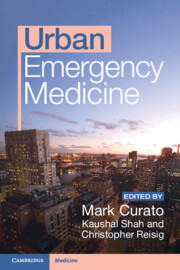Book contents
- Urban Emergency Medicine
- Urban Emergency Medicine
- Copyright page
- Contents
- Contributors
- Preface
- Chapter 1 Caring for the Homeless
- Chapter 2 Disruptive and Dangerous Agitation
- Chapter 3 Penetrating Trauma
- Chapter 4 Substance Use
- Chapter 5 Human Trafficking
- Chapter 6 Travelers from Overseas
- Chapter 7 HIV, AIDS, and Tuberculosis
- Chapter 8 Asthma
- Chapter 9 Physician/Patient Discordance
- Chapter 10 LGBTQIA+ Care
- Chapter 11 Child Maltreatment
- Chapter 12 Care of Vulnerable Elders
- Chapter 13 Civil Unrest: Caring for Police and Protesters
- Chapter 14 Terrorism and Mass Casualty Incidents
- Chapter 15 Overcrowding, Triage, and Care Rationing
- Index
- References
Chapter 10 - LGBTQIA+ Care
Published online by Cambridge University Press: 20 July 2023
- Urban Emergency Medicine
- Urban Emergency Medicine
- Copyright page
- Contents
- Contributors
- Preface
- Chapter 1 Caring for the Homeless
- Chapter 2 Disruptive and Dangerous Agitation
- Chapter 3 Penetrating Trauma
- Chapter 4 Substance Use
- Chapter 5 Human Trafficking
- Chapter 6 Travelers from Overseas
- Chapter 7 HIV, AIDS, and Tuberculosis
- Chapter 8 Asthma
- Chapter 9 Physician/Patient Discordance
- Chapter 10 LGBTQIA+ Care
- Chapter 11 Child Maltreatment
- Chapter 12 Care of Vulnerable Elders
- Chapter 13 Civil Unrest: Caring for Police and Protesters
- Chapter 14 Terrorism and Mass Casualty Incidents
- Chapter 15 Overcrowding, Triage, and Care Rationing
- Index
- References
Summary
LGBTQIA+ patients are an important patient population to highlight when discussing urban emergency medicine. There are a multitude of terms regarding gender expression and identity that emergency medicine providers should familiarize themselves with if they plan on taking care of this patient population. Within the LGBTQIA+ population, there are specific medical and psychological issues that are relevant to each subgroup. Providers are not expected to know everything about their patients, but they must remember to remain open-minded and non-judgmental as they take care of everyone with precision and dedication. If a provider feels that the patient needs help in ways they cannot be of service, then the provider should be able to point the patient in the right direction via resources and referrals.
Keywords
- Type
- Chapter
- Information
- Urban Emergency Medicine , pp. 123 - 132Publisher: Cambridge University PressPrint publication year: 2023

